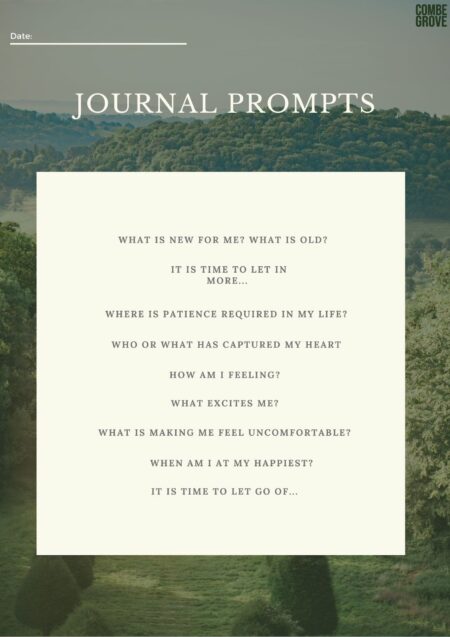Journal writing prompts- the benefits of journaling
Journal writing prompts- the benefits of journaling
What is journaling
From the French word jour, meaning daily, journaling is the practice of writing as a way of exploring thoughts and feelings surrounding the events of your life. Different from a diary, which is a way of recording events as they happen or of managing future events in your weekly or monthly schedule, a journal is a place where expressive writing can be used to explore ideas and interrogate feelings as a way of taking control of emotions and creating positive outcomes. Journaling is an excellent practice in support of mental health.
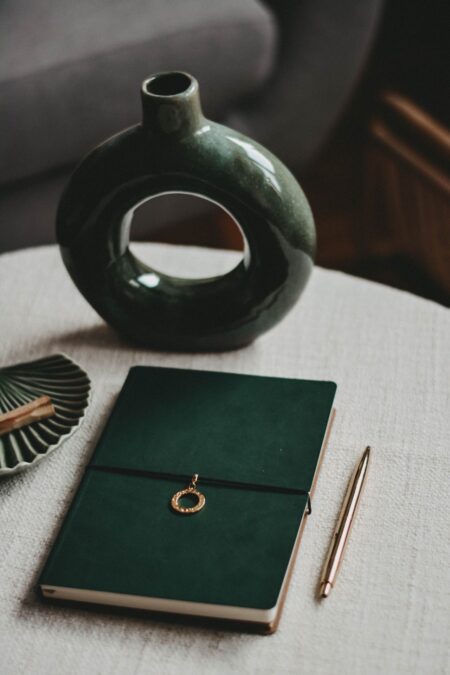
Ways to start Journaling
- Lists/bullets
- Free writing
- Morning pages
- Dream journaling
- Expressive writing
- Art journaling
- Unsent letters
- Worst case scenarios
- Gratitude journaling
Journaling Techniques
Visualisation to set intentions
Prepare a blank sheet of paper and your favourite pen. Settle back somewhere comfortable, close your eyes and allow your mind to drift. Choose a point in time in the future, 1 year, 5 or 10 years from now and visualise yourself there. Imagine where you would like to be, what you would like to be doing, with whom. Build a picture in your head. Look around and take in the setting. What you can see, hear, smell and how does it feel? Build a positive mental picture. Let your mind explore the scenario and when you are ready, write it down. Use this to set an intention for the future. Visualisation can help you focus your mind and take the first steps to making positive changes in order to turn your future dream into a reality.
You may like to download the journal prompts below to use as a starting point.
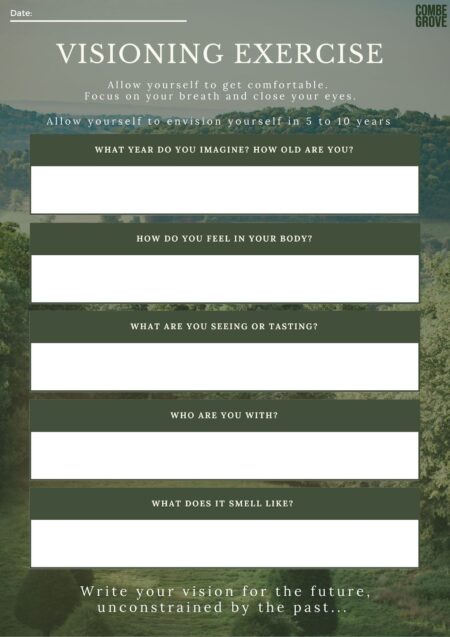
Expressive Writing to confront negative emotion
Scientific studies have found that writing about stressful, emotional or life changing events can result in improvements in psychological and physical health. In an expressive writing investigation, participants were asked to write about such events for 15-20 minutes on 3 to 5 occasions over a few days. Whilst the immediate effects were an increase in distress and negative mood compared to a control group who were asked to write factually about neutral topics, over the longer term there were found to be self-reported positive health benefits both physically and mentally. Outcomes included fewer stress-related visits to the doctor, improved immune system functioning, reduced blood pressure, improved mood and an overall feeling of greater psychological well-being.
Over the course of a week, try writing down your deepest thoughts and feelings about a traumatic experience or an extremely important emotional issue that has affected you and your life. Try relating your expressive writing to your relationships with others, your past, your present and your future. Either write about the same general issues or experiences each day, or a different event each day. Likely outcomes may be a reduction in the physiological stress that comes from the inhibition of emotions linked to past traumatic events and the cognitive processing of negative past experiences allowing the writer to develop ways to deal positively when faced with future challenging events.
Writing to elicit change – Above & Below the Line
The ‘above and below the line’ technique is one that represents a choice in the outcomes of your own decisions and is described to be one of the most impactful behaviour models.
Imagine a piece of paper with a line directly through the middle. Above the line illustrates how one may respond to a situation after giving it thought and time, below the line signifies how one may automatically react when faced with a difficult or negative situation.
Operating above the line is open, thoughtful and positive. It is about ownership, responsibility and positive solutions. Opposingly, below the line is more closed and holds more negativity, defensiveness and blame.
Above the line thinking is the way that we all strive to act when posed with a difficult decision. It requires openness, curiosity and accountability to respond positively and usefully in any given situation.
The intention to react ‘above the line’ is a process that first comes with questions such as:
- Where did this go wrong/ what could be done differently?
- What are my responsibilities here?
- How can I make it better?
- Where can I take ownership and accountability?
- What is my role?
- How can I support?
- How can I add value?
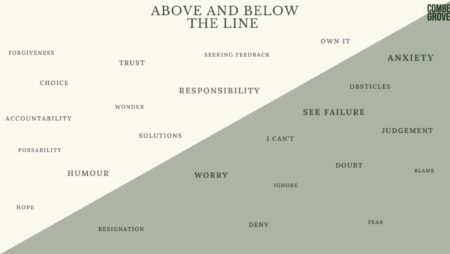
The most important thing is to first take ownership of both.
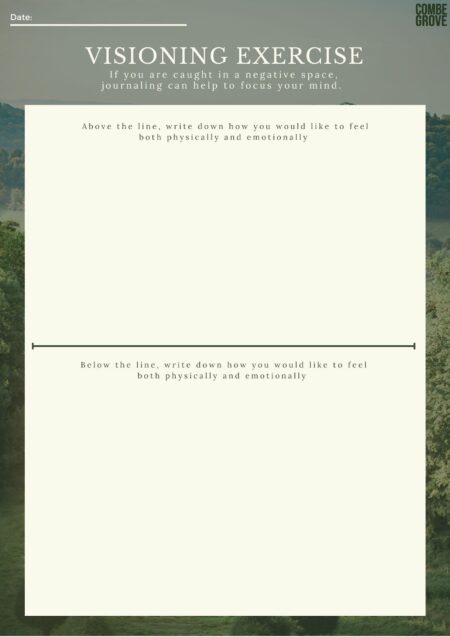
Gratitude journal for increased positivity
Gratitude journaling is the act of documenting 5 events that you are thankful for at the end of each day. Be it seeing a bird on the wing, marking the onset of spring or a long-awaited hug from a loved one. A simple walk in the park, receiving a hand-written letter from an old school or breaking bread with the family. There are many small and special moments each day that we can recognise being thankful for.
Gratitude exercises can have tangible benefits. According to a study by researchers from the University of Minnesota and the University of Florida, participants that wrote down a list of positive events, things that they were thankful for, at the end of a day and why the events made them happy lowered their self-reported stress levels and gave them a greater sense of calm at night. Writing a gratitude journal can help promote better sleep. Feel free to use the journal prompts below to start a gratitude journal.
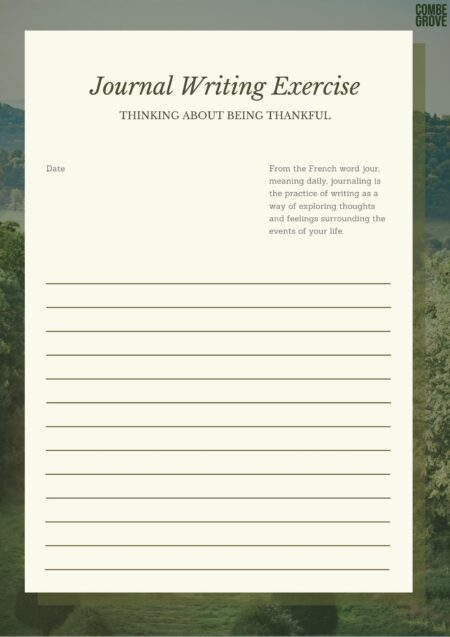
Journal writing prompts – Topics for journals
These quick journal prompts may help to promote the exploration of thoughts and mindful ideas for journal entries.
Journaling Tools
Ola Studios – @ola_studio are “Makers of modern British stationery celebrating pattern and simplicity. Inspired by an appreciation of art, design and craftsmanship.”
Amaretti Designs – @amarettidesigns Create notebooks inspired by art, design and architecture. Designed to be kept for life, Amaretti designs focus on durability as well as sustainability.
Studio Scribe – @studioscribeuk Create monthly planners, habit tracker and journal pages, made to promote order, balance and a moment of calm.
Papier – @papier sell wellness journals and creative writing notebooks with unique designer collaborations or custom made by you. Sustainably sourced paper.
Faye Co Papier – @fayecopapier Mindful and minimalist lifestyle stationary to “allow you to key actions your thoughts and visions from your mind to become reality.”
The Happy Self Journal – journal writing prompts for kids @happyselfjournal have created an alternative journal with prompts for kids to “promote happiness, develop positive habits and nurture enquiring minds”
